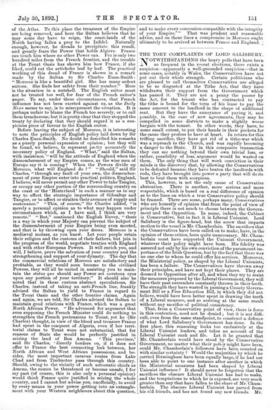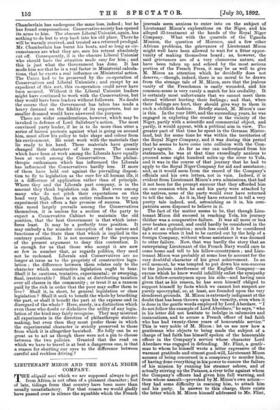THE TORY COMPLAINTS OF LORD SALISBURY. N OTWITHSTANDING the heavy polls
that have been so frequent in the recent elections, there exists a suspicion—apparently a well-grounded suspicion—that in some eases, notably in Wales, the Conservatives have not put out their whole strength. Certain politicians who are pleased to call themselves Conservatives are alleged to be so disgusted at the Tithe Act, that they have withdrawn their support from the Government which has passed it. They are not a penny the poorer by the Act, for the tenant who has contracted to pay the tithe is bound for the term of his lease to pay the same amount to the landlord in the shape of additional rent. But they have the annoyance of paying it, and possibly, in the case of new agreements, they may be compelled in some districts to make a slightly worse bargain with the tenant. In other words, they have, to some small extent, to put their hands in their pockets for the cause they profess to have at heart. In return for this trifling sacrifice, they have got rid of a tithe-war which was a reproach to the Church, and was rapidly becoming a danger to the State. If in this composite transaction they can see nothing beyond their own trivial loss, or rather, possibility of loss, argument would be wasted on them. The only thing that will work conviction in their minds is the discovery that, by allowing the Conservatives to be defeated because they have beaten the landlords with rods, they have brought into power a party that will do its best to beat them with scorpions.
This, however, is not the only cause of Conservative abstention. There is another, more serious and more respectable, which is based on a real difference of opinion as to the lines on which a true Conservative policy should be framed. There are some, perhaps many, Conservatives who are honestly of opinion that from the point of view of principle there is not much to choose between the Govern- ment and the Opposition. In name, indeed, the Cabinet is Conservative, but in fact it is Liberal Unionist. Lord Salisbury is the figure-head, but the screw that imparts motion to the vessel is Mr. Chamberlain. The sacrifices that the Conservatives have been called on to make, have, in the opinion of these critics, been quite unnecessary. Mr. Cham- berlain must have supported the Unionist Government, whatever their policy might have been. His fidelity was assured not only by his own conviction of the paramount im- portance of the Irish Question, but by the fact that there was no one else to whom he could offer his services. Moreover, the Ministerial policy, as shaped by the Liberal Unionists, has been a failure. The Conservatives have thrown away their principles, and have not kept their places. They are doomed to Opposition after all, and when they try to resist the measures proposed by the Liberal Government, they will have their past surrenders constantly thrown in their teeth. The strength they have wasted in passing a County Govern- ment Bill or a Free Education Bill, in which they did not believe, would have been better spent in drawing the teeth of a Liberal measure, and so arriving at the same result without any sacrifice of political consistency. That, from a Conservative point of view, there is force in this contention, need not be denied ; but it is not diffi- cult, even from the same standpoint, to construct a defence of what Lord Salisbury's Government has done. In the first place, this reasoning looks too exclusively at the Liberal Unionist leaders, and takes no account of the Liberal Unionist rank and file. Let it be granted that Mr. Chamberlain would have stood by the Conservative Government, no matter what their policy might have been, could Mr. Chamberlain's followers have been counted on with similar certainty ? Would the majorities by which he carried Birmingham have been equally large, if he had not been able to point to one instance after another in which the Ministerial measures had been shaped by Liberal Unionist influence ? It should never be forgotten that the sacrifices the obscure Liberal Unionist has had to make, and the temptations to which he is exposed, are very much greater than any that have fallen to the share of Mr. Cham- berlain. The obscure Liberal Unionist has parted from his old friends, and has not found any new friends. Mr. Chamberlain has undergone the same loss, indeed ; but he has found compensations. Conservative society has opened its arms to him. The obscure Liberal Unionist, again, has nothing to do but to step back into his old place. There he -will be warmly received, and treated as a returned prodigal. Mr. Chamberlain has burnt his boats, and so long as cir- cumstances are what they are, sees his retreat absolutely cut off. Consequently, it is the obscure Liberal Unionist who should have the situation made easy for him ; and this is just what the Government has done. It has made him see that he is a real factor in Ministerial calcula- tions, that he exerts a real influence on Ministerial action. The Union had to be preserved by the co-operation of Conservatives and Liberal Unionists ; and except by an expedient of this sort, this co-operation could never have been secured. Without it the Liberal Unionist leaders might have continued to work with the Conservatives, but they would have been leaders without followers. No doubt the course that the Government has taken has made a heavy demand on the fidelity of its supporters, but no smaller demand would have answered the purpose.
There are wider considerations, however, which may be invoked in defence of Lord Salisbury's action. The most convinced party leader, if he is to do more than utter a series of barren protests against what is going on around him, must allow his policy to take shape and colour from his environment. He must work with the materials that lie ready to his hand. These materials have greatly .changed their character of late years. The causes which have been at work among the Liberals have equally -been at work among the Conservatives. The philan- thropic enthusiasm which has influenced the Liberals has influenced the Conservatives hardly less. If more of them have held out against the prevailing disposi- tion to fly to legislation as the cure for all human ills, it is a difference of application rather than of principle. Where they and the Liberals part company, is in the amount they think legislation can do. But even among many who do not pitch their expectations on this head very high, there is an entire readiness to try any -experiment that offers a fair promise of success. When this mood largely prevails among the Conservatives themselves, it is useless for a section of the party to expect a Conservative Cabinet to maintain the old _position, that the best Government is that which inter- feres least. It may be a perfectly true position. It may embody a far sounder conception of the nature and functions of the State than that which is implied in the contrary position. It is not necessary for the purposes -of the present argument to deny this contention. It is enough for us that those who accept it are now so few in number that, as regards politics, they need not be reckoned. Liberals and Conservatives are no longer at issue as to the propriety of constructive legis- lation; the difference between them relates only to the character which constructive legislation ought to bear. Shall it be cautious, tentative, experimental; or sweeping, final, irretrievable ? Shall it aim at distributing taxation over all classes in the community ; or treat it as a ransom rid by the rich in order that the poor may suffer them to live? Shall it, in short, be general legislation or class legislation ? Shall it seek to benefit the whole by benefiting -the part, or shall it benefit the part at the expense and in • disregard of the whole ? Here, surely, is a distinction which even those who doubt or disbelieve the utility of any legis- lation of the kind may fairly recognise. They may mistrust all experiments in the direction of philanthropic statute- making, but even then they must prefer those in which -the experimental character is strictly preserved to those -from which it is altogether banished. No folly can be so :great as to act as though there were not a pin to choose between the two policies. Granted that the road on which we have to travel is at best a dangerous one, is that a reason for shutting our eyes to the difference between .careful and reckless driving ?



































 Previous page
Previous page